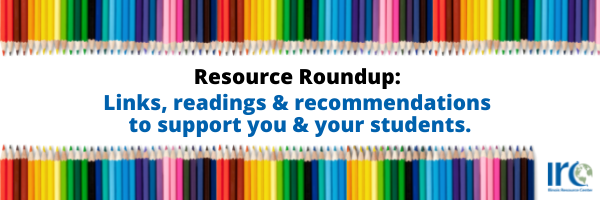 |
Over the past few months, the IRC has asked members of our community to nominate Illinois teachers working with multicultural, multilingual students who are going above and beyond, and now, we’re celebrating them and highlighting their work. Keep an eye out for these features in the coming months – and if you’d like to nominate someone, email leanet@cntrmail.org. Next up is Jackie Griffin, the Director of Curriculum, Professional Learning and Language at East Prairie School District 73.
Says Hal Schmeisser, who nominated her: I would like to nominate Jackie Griffin the Director of Curriculum, Professional Learning, and Language at East Prairie School District 73 for recognition in the IRC’s Educator Spotlight. In the three years since Jackie has joined the East Prairie team, our systems, structures, practices, and mindsets have transformed in a way that is supportive to the learning and social-emotional wellbeing of all students, with particular emphasis on our multilingual learners.
I have had the extraordinary privilege to work with many outstanding educators in my career, Jackie is amongst the most distinguished. She holds high expectations for students, colleagues, and above all herself. She models on a daily basis what it means to be a caring, collaborative, and child-centered educator. Every decision that Jackie makes is driven by what’s best for kids: She is a truly transformative educational leader!
Jackie Griffin has worked with multilingual students for nearly two decades, spanning classroom teaching, administration and instructional coaching. From those experiences, she knows the value of collaboration — with her fellow educators, with families, with administration and with students. In that time, she’s seen a lot of changes for the better.
“In the places I’ve worked, multilingual students are viewed as an asset instead of something different,” she says. “They’re being included and having the same expectations as other students. We know that multilingual students may need support along the way, which is why there’s a specific focus on how to make the content accessible to students in the classroom as opposed to pulling them out to teach them English.”
To effectively serve the diverse community of East Prairie, where more than 50 languages are spoken by students and families, she has looked to models for collaboration to promote transformative change. She is a big champion of co-teaching, and has learned a lot from thought leaders in the field, notably Andrea Honigsfeld.
“Andrea Honigsfeld has helped me define co-teaching as co-teaching, co-planning, and co-assessing”. Co-teachers do not think, ‘these are your students, these are my students,’” when collaboration is at its best. The teachers believe, “these are truly our students.”
Jackie works with EL and classroom teachers in her school to develop the components of co-teaching along with what it looks like in practice, ensuring that every lesson has a purpose. The district has three amazing EL teachers, and through co-teaching and constant daily communication between EL and general education teachers, she says multilingual students are receiving the support they need.
“The services don’t end when the EL teacher leaves the classroom. Because the EL teacher and classroom teacher plan together, language supports are embedded into other lessons that the teachers talk through.” she says. “The EL teachers are part of team meetings as well as individual teacher meetings. There’s so much more support in those co-taught classrooms.”
At the beginning of each school year, teachers create a partnership agreement with their co-teachers around how they’re going to work together and their shared beliefs around students and expectations. A goal of ours has been to maintain an asset-based mindset by focusing on what students can do instead of what they can’t do. “When I get to see the teachers at the end of the year, a lot of what people celebrate is that sacred co-planning time and the relationships they have built with the teachers and the students,” she says.
Griffin has also worked with students and educators alike to focus on student writing. When a data dive on ACCESS scores showed writing as an opportunity area, she was intentional about EL teachers receiving professional development focused on writing and a better understanding of the WIDA rubric. For students on the cusp of meeting their proficiency scores, she and her team launched an after-school writing club, with assignments spanning on different areas of writing, from vocabulary and adding details to persuasive and narrative writing. Every student that participated in the workshop the first year exited on ACCESS, and 85% percent exited this past year.
Her advice for educators working with multilingual learners is simple: start small and start with a goal. “Start with identifying one thing that will help students make language growth and proficiency,” she says. “Once you do that, make one small step. Try implementing something that you believe will achieve that goal and reflect along the way to see if it is having the outcome you hoped for.”


